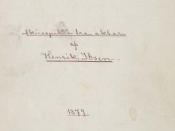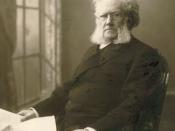Excitement through Realism
Before the women's rights movement of the 19th century, women typically played domestic roles as wives and homemakers, without much opportunity to adventure outside that realm. Accordingly, an epiphany was sparked by key influences in literature to advance the feminist movement that continues to this day. One such propagator was Henrik Ibsen, whose controversial play A Doll's House conveyed ideas of female empowerment through the internal struggle of the protagonist Nora Helmer. Nora is consistently belittled by her husband Torvald, but eventually faces her own disillusionments to escape her restricted lifestyle. In contrast to Ibsen's style of realism, most plays during the 1800s were characterized by external conflicts that built up suspense and anticipation; nonetheless, Ibsen is able to replicate the same action within an internal conflict through his employment of realistic diction.
Ibsen generates excitement in Nora's inner dilemma through her confessional dialogue with her old friend Mrs. Linde. Nora discloses her darkest secret of borrowing money without Torvald's consent to Mrs. Linde, who plays the role of her wise confidante. After Mrs. Linde advises Nora to confess to her husband, Nora exclaims "Good heavens, noâ¦It would upset our mutual relations altogether; our beautiful happy home would no longer be what it is now" (Ibsen 12). Ibsen utilizes the standard colloquial of the 1800s as the diction for Nora's dialogue; thus, by using common, unsettling phrases like "good heavens" or "upsetâ¦altogether," Ibsen promotes a tone of apprehension for a bleak future. He further builds anticipation by foreshadowing the destruction of Nora's marriage, an internal conflict that would ruin her seemingly perfect life in the "beautiful happy home". Ibsen's harbingers of Nora's doom through simple conversation create a similar effect to the vivid images of danger that suggest external problems in other plays. They both...


